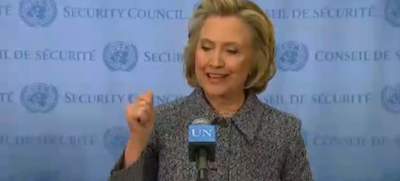
Using the United Nations as a backdrop to theatrically remind people of her foreign policy gravitas, Hillary Clinton held what the UN referred to as a press "encounter" in front of the UN Security Council today. Hillary repeated over and over again her well-rehearsed talking points regarding the private e-mail account she used during her tenure as Secretary of State. Figuring that it is better to beg for forgiveness rather than refrain from doing something that could later be considered wrong-doing, Hillary said that "looking back" she now thinks it would have been better if she had used one device connected to the official government e-mail account and a separate separate device connected to her own personal e-mail system.
The former Secretary of State just thought at the time it would be more convenient to use only one device for both her personal and work-related e-mails, connected to a server that had been previously set up for her husband's New York office, rather than two separate devices and e-mail accounts.
Hillary's defenses amounted to the following four talking points: (1) She obeyed all laws and regulations that were in effect at the time and no classified materials were communicated via her e-mails. Moreover, what she did was not unusual. Other former Secretaries of State did the same thing; (2) She made sure to send many of her work-related e-mails to State Department and other federal government employees, whom she assumed were on the official .gov e-mail account. Therefore, such e-mails would have been captured and automatically archived on the government system; (3) She bent over backwards to turn over all e-mails that were even "possibly" work-related to the State Department in response to its request for such e-mails from all prior Secretaries of State. Hillary only got rid of the e-mails she determined to be personal (which may have been as many as 30,000, although the precise number was not entirely clear from her remarks); and (4) it is the responsiblility of each federal employee to determine which of his or her e-mails will be regarded as personal and which ones will be determined to be work-related, which is precisely what Hillary said she did in making the selection of the e-mails turned over to the State Department.
None of these defenses stand up to any objective scrutiny.
First of all, there were archive regulations in effect in 2009, which required federal employees - including Hillary while she was Secretary of State - to preserve her work-related e-mails. The "every-one did it" defense holds no water because Hillary's use of her own private server, set up in her New York residence, was reportedly unprecedented. Hillary rejected the suggestion that an independent third party examine her server including its hard drive, which raises the inevitable question of whether she is trying to hide something. Her privacy rationale is bogus, considering her decision to blend personal and work-related e-mails on the same personal account hosted by the same home-installed server in the first place. All Hillary could say was that the server "will remain private."
Moreover, even if Hillary's contention that she sent many of her work-related e-mails to government employees, expecting them to be automatically archived, is true, such action alone would not address any e-mails she may have sent to foreign government officials or to prospective donors to the Clinton Foundation that were not also sent to federal government employees.
Hillary's defense that it is up to each federal employee to decide individually which of his or her e-mails are personal and which are work-related does not mean that such decision cannot be examined by the government and remedied if necessary. In Hillary's case, that is impossible due to her refusal to turn over the server sitting in her residence to an independent examiner. We have to take her word that she turned over all e-mails that were even "possibly" work-related which, given her track record, is not very reliable. One question has already arisen regarding Hillary's trip to Libya in October 2011 when she was photographed with "her handheld device in her hand," according to South Carolina GOP Rep. Trey Gowdy, the chief congressional Benghazi investigator. Congressman Gowdy said that "we have no e-mails from that day. In fact, we have no e-mails from that trip.”
While most of the questions asked during Hillary Clinton's press encounter dealt with her e-mail situation, she was also asked how she could reconcile her long advocacy of women's rights with her foundation's acceptance of donations from countries with abysmal human rights records involving women and girls. Hillary ducked the question. Hillary said that her advocacy of women's rights issues over the years is unquestionable. And she said she is proud of the work of the Clinton Foundation. Hillary added that she had no doubt that "people who want to support the foundation know full well what it is we stand for and what we're working on." Apparently taking money from countries like Saudi Arabia, where women are still treated as chattel, does not in Hillary's mind call into question how committed she and her foundation really are to "working on" ending violence and discrimination against women and girls in Saudi Arabia and other human rights abusing Middle Eastern countries that are sources of foundation donations.
In sum, Hillary Clinton tried to use the typical Clintonian evasive tactics, hoping the press and the American people will move on to other matters. The Clintons have gotten away with their "what difference does it make" attitude many times before. Hopefully, the truth will finally catch up with them this time, especially if Hillary, as expected, does run for president.
